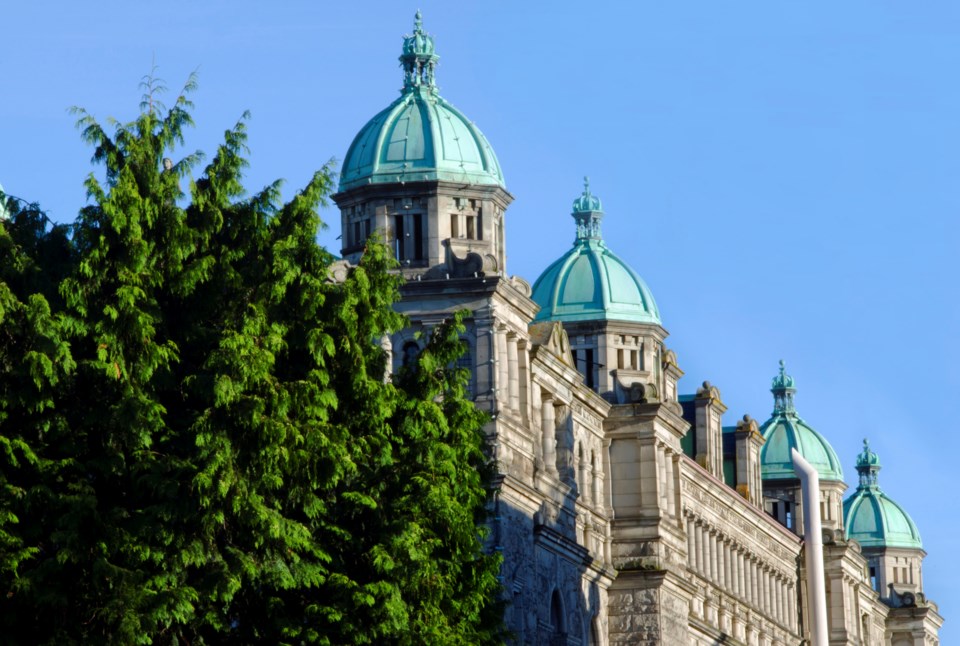The all-party committee that oversees sa国际传媒’s Legislative Assembly is asking the NDP government for a $100.3 million operational budget in the next fiscal year.
The amount in the estimates passed at the Jan. 13 meeting of the Legislative Assembly Management Committee is $8.4 million, or 9%, higher than the current year, but almost $5 million less than the draft tabled in December when MLAs decided to freeze their pay for the next fiscal year.
Foregoing the cost of living increase that was scheduled for April 1 will save $645,000, but the MLAs also decided not to proceed with a new funding model for constituency offices and staff benefits. That allowed them to pare down the proposed budget by nearly $3 million.
“Taken as a complete package, in our opinion, it seemed to be excessive,” BC Liberal house leader Todd Stone told the committee meeting. “It seemed to be a bit too much, again considering the backdrop of the struggles that British Columbians are facing right now.”
Green Party house leader Adam Olsen said he was disappointed the issue was politicized and improperly framed, because constituency offices are not to support MLAs, but the end user.
“That was made to be seen to be a dirty act, that it was an MLA service when, really, it was how MLAs serve their communities, how they communicate with their communities, ensuring that there are adequate resources to do a good enough job, ensuring that the constituency advocates and assistants can get paid a living wage and are able to survive under the extreme pressures that they're facing,” Olsen said.
Basic MLA pay remains $115,045.93 a year. David Eby receives an additional $103,541.34 a year as premier for a total $218,587.27. Cabinet ministers and opposition leader Kevin Falcon are paid $172,568.80 annually.
In last spring’s budget, the NDP government did away with the 10% penalty for each cabinet members whose ministry overspends. It amounted to a $5,551 raise per minister.
Even without a pay raise for inflation in 2023, MLAs who were first-elected in 2017 are looking forward to June. That is when they meet the six-year requirement to qualify for a pension.
The proposed budget is split mainly between members’ services, which funds MLAs, their staff and offices, ($45.02 million) and legislative support services staff at the Legislature ($43.3 million). Caucus support services, which funds each party’s operations at the Legislature, is the third major budget category ($8.9 million).
The earlier version of the budget had foreseen a 12% increase to members services at $49.4 million.
The new budget does increase constituency office allowances, capital city living allowances and in-constituency staff travel allowance by 6% for inflation.
The Office of Speaker Raj Chouhan ($694,000) and Office of Clerk Kate Ryan-Lloyd ($341,000) are getting increases.
The budget includes $3.75 million more for base salaries and overtime (13.9%) to $30.72 million and an employee benefits increase of $2.46 million (19.4%) to $15.15 million.
Within the $7.2 million Legislature Support Services increase (an 18% year-over-year increase), is allowance for the Sergeant-at-Arms department to hire 15 new full-time security and safety staff and information technology to increase its staff by four.
The Legislative Assembly is also seeking $9.3 million for capital funding, 2% less than the current year, for safety, building envelope and security upgrades, along with IT infrastructure improvements.
The Legislature reconvenes for the Feb. 6 Throne Speech. NDP Finance Minister Katrine Conroy is scheduled to table the budget on Feb. 28.


